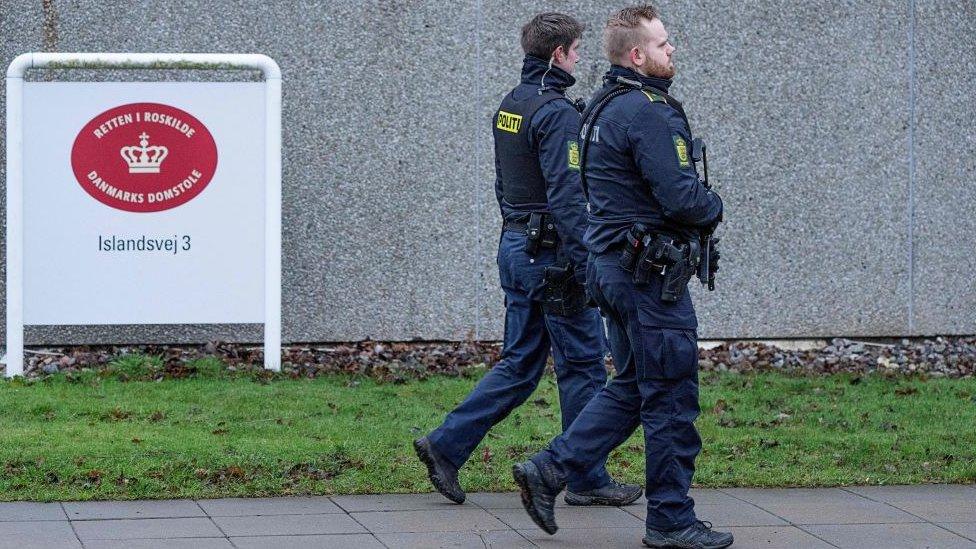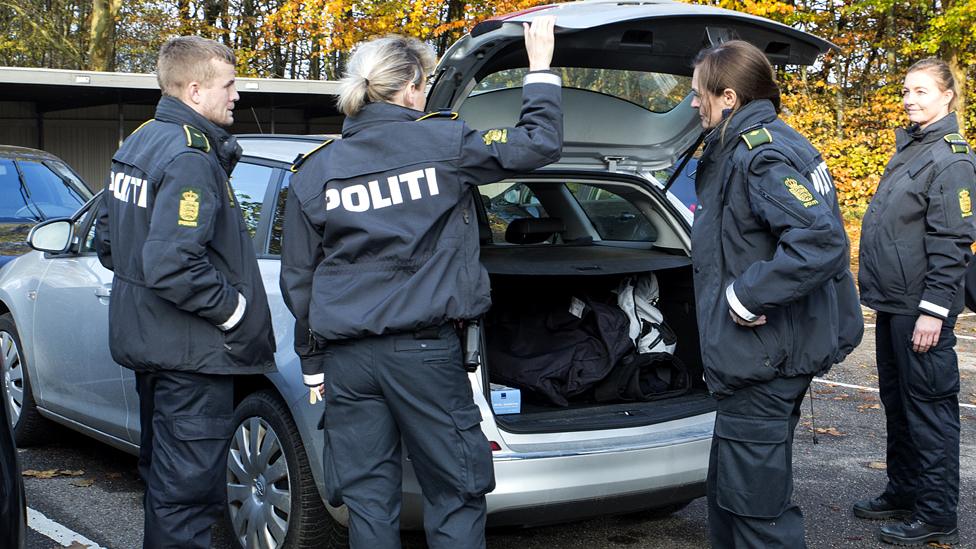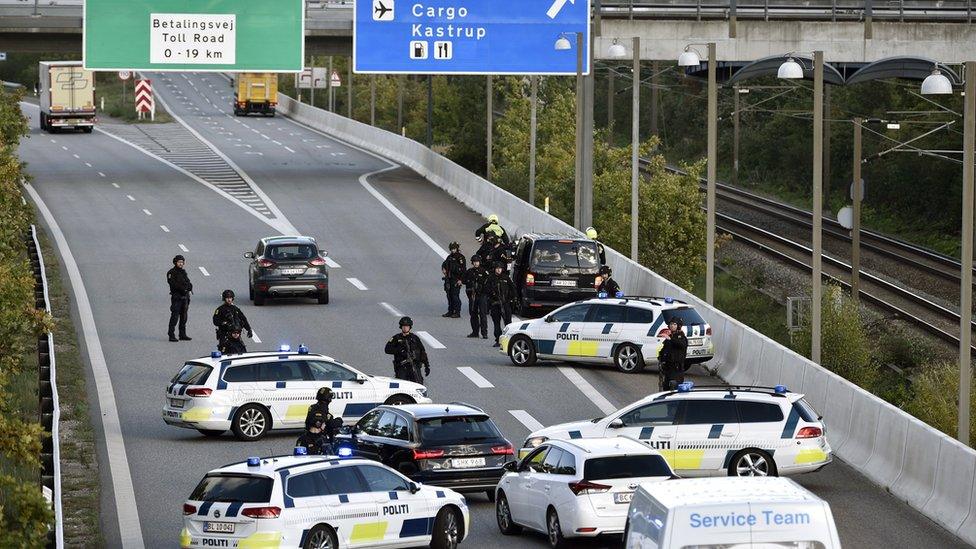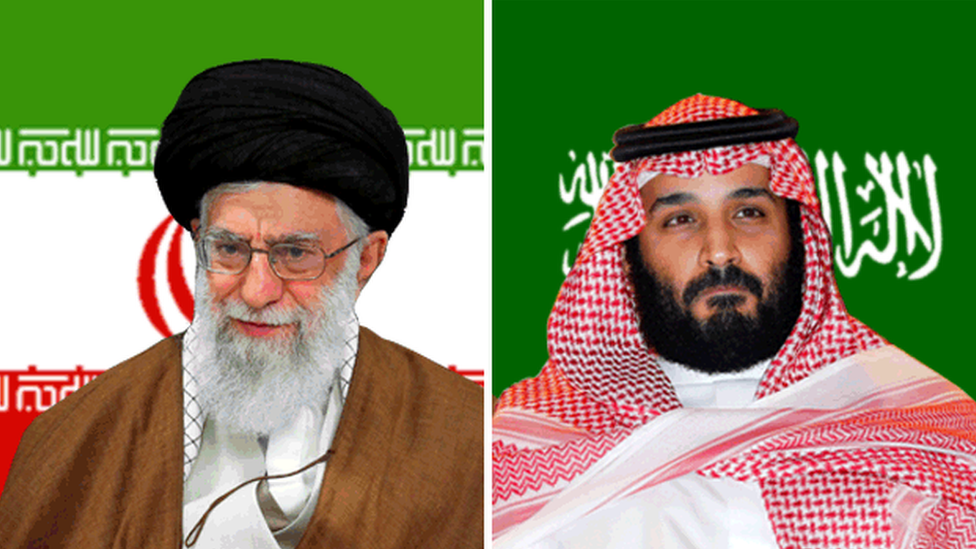Saudi-backed Iran spies found guilty in Denmark
- Published

The trial at Roskilde District Court was conducted under heavy security
A Danish court has found three members of an Iranian opposition group guilty of spying for Saudi Arabia.
The three men were detained by police in February 2020 and are members of the Saudi-backed Arab Struggle Movement for the Liberation of Ahvaz (ASMLA).
They were also found guilty of "promoting terrorism" by supporting its armed wing in Iran.
They face sentencing next month, with possible prison terms of up to 12 years and deportation.
During a lengthy trial at Denmark's Roskilde District Court, the jury heard that between 2012 and 2020 the three men had passed information on a variety of Danish individuals and organisations, as well on Iranian military affairs, to Saudi intelligence officers in exchange for payment.
The men, aged between 41 and 50, received 15m kroner (£1.27m) from Saudi intelligence operatives. One is a Danish citizen.
Prosecutors said the money then helped finance the activities of ASMLA's armed wing in Iran, called the Mohiuddin Nasser Martyrs Brigade.
ASMLA is a separatist movement that seeks a separate state for ethnic Arabs in Iran's oil-producing south-western province of Khuzestan.
The group is viewed as a terrorist organisation by the Iranian regime and its armed wing has carried out a number of violent attacks, including an attack on a military parade in the south-western city of Ahvaz in 2018 in which 24 people died.
The court also found the men guilty of supporting militant group Jaish al-Adl, which operates in Iran and is listed as a terrorist organisation in the US.
The case is the latest example of a growing espionage battle between Saudi- and Iranian-backed intelligence operatives in Denmark.
In 2018, one of the three men was the target of an assassination attempt believed to have been sponsored by Tehran, which saw a Norwegian-Iranian jailed for seven years over his role in the plot.
Iran dismissed the allegations, but Denmark recalled its ambassador in protest.
The head of Denmark's PET intelligence agency, Finn Borch Andersen, warned afterwards that it would not accept that foreign states bringing "their mutual conflicts" to Danish soil.

ASMLA's struggle for Iran's ethnic Arabs
By Sarbas Nazari, BBC Monitoring
Known also by its Arabic name, al-Nidhal, the group has been seeking independence since 1999 for Iran's largely marginalised ethnic Arab minority.
Iran's ruling establishment has branded ASMLA a terrorist organization, linking it to a multitude of deadly attacks, most notably a 2018 ambush on an Army Day parade in the south-western city of Ahvaz.
ASMLA has denied involvement in the attack that left more than two dozen people dead, among them women and children.
One of the group's senior leaders, Habib Chaab, is currently facing terror-related charges in Tehran. The Sweden-based dissident was lured by Iranian intelligence operatives into a visit to Turkey in 2020 before being transferred to Iran in what Turkish authorities described as a kidnapping operation.
During Chaab's three hearings so far, prosecutors have specifically named Iran's arch-foe Israel and regional rival Saudi Arabia as supporters of the ASMLA, while also accusing Denmark and Belgium of harbouring its members.
Iran's Arab minority predominantly live in the oil-rich Khuzestan province. Despite sitting on abundant energy supplies, the province has remained deeply underdeveloped, grappling with a plethora of economic and political grievances.
And the region's water crisis has only exacerbated the already dire situation. Week-long protests against water mismanagement last summer triggered live fire from security forces and saw at least three people killed.
Related topics
- Published3 February 2020

- Published31 October 2018

- Published16 September 2019
